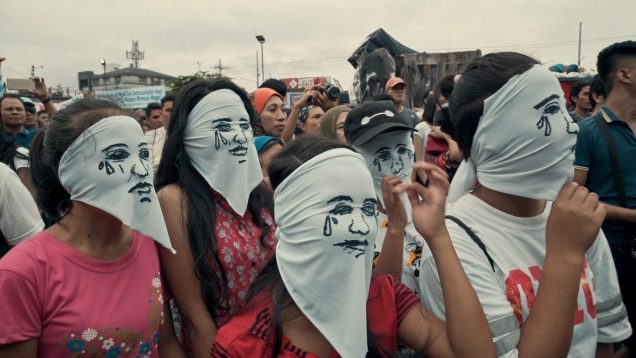Gruesome film on monster metropol
Gruesome film on monster metropol
 Film Review: Aswang (2019)
Film Review: Aswang (2019)
By Ysh Cabana
The Philippine Reporter
Filmmaker Alyx Ayn Arumpac begins her debut documentary Aswang with grotesque scenes, presenting social realism of nightmarish visuals and infusing uniquely folkloric narration. This level of ambiguity in the art of moving image shows its sense of appeal in traversing a popular discourse and critically laying down its insights on a country suffering on its own horrors.
In terms of atmosphere, Aswang is as gruesome a film as it is bold—referencing the shape-shifting evil spirits in FIlipino mythology. It is a piece that serves to convey an appalling message even to an international audience not fully aware of the issues that continue to plague the Philippines. To some, it can be interpreted to be the monster that is the metropolis, in particular its slums teeming with street crime or some unholy business. But for many, the titular role is reserved for the cops teamed as on-the-leash creatures who can do the government’s dirty work to prey on the poor with utter deniability.
Without giving too much, the metaphor reveals itself to be a vivid scenario of the Philippines plagued by its complex politics under a mythical predator. There’s no direct interviews with electoral representatives, or operatives, and Mr. Duterte appears only via a demonic effigy. Rather, Arumpac focuses on “those who died from sickness or violence and don’t have money for burials” and those whose lives are affected by the legacy of the president’s hardline proclamations since 2016. As a character remarks “President Duterte kept his campaign promise,” by killing “the drug users” and “everybody involved in drugs.”
To give context, the film gives the chilling context of a rising death toll. A precise figure of 31,232 fatalities is quoted at one point under the so-called Duterte’s war on drugs. The brute intensity of the killings made the sight of corpses and bloodied bodies unsubstantiated in pavements a part of normalcy. Beyond the statistics, the narrative gives a glimpse of the specific case of teenaged Kian delos Santos, tortured and killed by the police after being accused as a drug runner.
The filmmaker then follows Jomari, a street kid and one of Kian’s closest friends who serves as the protagonist and interstitial of sorts in a downbeat thread of other select subjects: a stoic mortician, a crusading photojournalist, and a brave missionary all with different backgrounds intertwined by the fascist attacks of the powers that be. Each anecdote adds layer to the bloody urban fabric of state-sponsored terror and structural inequality, which has only justified the further oppression of the people.
Jomari’s parents, we would be informed by fellow young street urchins, are imprisoned for peddling drugs. Yet he maintains a playful personality that tugs at one’s heartstrings. Jomari visits some of his late friends in the cemetery—where the landscape of memories are hardly perceptible with the dirt and rubbish. They are Manila’s lost boys—whose future seems unforeseeable—as they reenact a scene where operatives beat up and shoot to kill. Authorities claim they deserved death because they fought back, “Nanlaban.” But it gives a hint of their own voices: the police are our “enemy.”
Throughout its stretch, a haunting female voice serves as the most important storyteller. In elegiac delivery, she warns of the harrowing days to come and says that this is only the beginning when “people refuse to be afraid and choose to look the monster directly in the eye.”
Having its world premiere last November 2019 at the International Documentary Film Festival Amsterdam (IDFA), Aswang has proven to be a master class in narrative documentary. It has also been made available for limited screening in July this year.
Aswang
Director: Alyx Ayn G. Arumpac; narrator: Giancarlo Abrahan; cinematographer: Tanya Haurylchyk, Alyx Ayn G. Arumpac; editors: Fatima Bianchi, Anne Fabini; music: Teresa Barozzo; sound: John Michael Perez, Mikko Quizon; colour: Passakom Yaisiri, Sorawich Khunpinij; producers: Alyx Ayn G. Arumpac, Armi Rae Cacanindin. Rating: Not rated. In Filipino with English subtitles. Running time: 85 mins.
Comments (0)